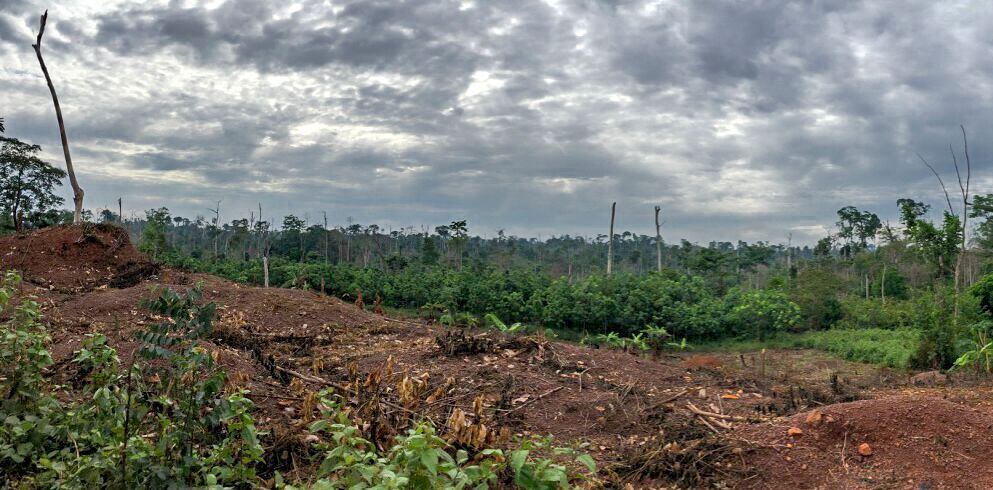Groups allege chocolate firms, occasionally through traders or middlemen, cluster smallholder farmers in West Africa and Latin America to create what are legal cooperatives.
But they contend these co-ops are sometimes setup to benefit companies rather than farmer members, which can lead to exploitation of fair trade and organic certifications.
Fairtrade International rules dictate only cooperatives democratically overseen by farmer members via free and fair elections with equal voting rights for members can be certified Fairtrade.
Leading cocoa certification program UTZ’s Code of Conduct does not mention democratic elections, but says certified cooperatives and groups must follow ‘control points’ guaranteeing certain access to training and inputs.
But there are allegedly some cooperatives working closely with cocoa traders or chocolate companies flaunting certification rules.
Cooperatives or buying agents?
Sako Warren, executive secretary of the World Cocoa Farmers Organization (WCFO) – a trade body for smallholders and organized groups of cocoa farmers - alleged many cooperatives in Africa and Latin America today are more like licensed buying agents.
“They are not actually cooperative-oriented by members and farmers. They are buying agents established by one of the chocolate companies.
“When you have for instance in Côte d'Ivoire 20 co-operatives you're not going to find two that are farmer driven,” he alleged.
Cocoa: A disorganized sector

- 90 to 95% of cocoa grown by smallholders – in contrast to plantation model of crops such as banana and tea.
- Main producing countries: Côte d’Ivoire (32%), Ghana (18%), Indonesia (17%), Nigeria (8%) and Cameroon (6%).
- Around 23% of the global cocoa area is certified
Source: International Trade Center: ‘The State of Sustainable Markets 2017’
Grouping farmers
Major chocolate companies are rapidly expanding their sustainable cocoa sourcing programs, typically via fair trade certified cooperatives.
They do so in a global cocoa market made up of 90-95% smallholder farmers – often living in remote rural areas - who are not part of a cooperative or organized group.
The chocolate industry therefore helps to support cohorts of farmers to become organized groups to disseminate its sustainability programs.
Farmer trade bodies are often supportive of these programs, but fear companies will subtly govern farmer groups for their best interests rather than for those of farmer members.
‘We buy from cooperatives’
Warren described cooperatives as individual farmers coming together of their own free will to improve their production and livelihood.
“But what we have in most producing countries especially in West Central Africa is cooperatives put in place by one of the chocolate companies so they can say to people ‘we buy from cooperatives’.”
He alleged this was leading to ‘real' farmer-driven cooperatives being neglected by the chocolate industry.
"Most of the time you see these groups are being created in communities that are not too far from Abidjan or Accra where they [chocolate companies and traders] have the means of shipping. And that's where we have a very small number of farmers,” added Warren
He said chocolate companies should encourage the grouping of the 90-95% of smallholders so they are well trained and sensitized on child labor.
But he said companies should do so in partnership with credible farmer organizations or established ‘real cooperatives’, so it is done independently for the benefit of farmers.
"Farmers must be independent producers and should be treated as entrepreneurs….Cocoa farmers are not just cocoa farmers they are businessmen and women,” he said.
“The downstream cocoa market is highly consolidated, and the fact that the production base is largely unorganized has resulted in a substantial imbalance of negotiating power.”
International Trade Center in ‘The State of Sustainable Markets 2017’ report, published June 23, 2017
- Three processers account for more than 40% of global cocoa processing
- Cocoa farmers typically receive just 6.6% of the value of a $1 chocolate bar, while processors take 7.6%, chocolate manufacturers receive 35.2% and retail & taxes take 44.2%. (Cocoa Barometer 2015)
WCF: Developing co-ops is critical to sustainable sector
Richard Scobey, president of the World Cocoa Foundation (WCF), an industry-led body on cocoa sustainability whose members include Mars, Nestlé and Ferrero, said the industry is very focused on investing in the development and strengthening of farmer organizations.
“We really believe cooperatives and other forms of association are critical for delivering agricultural and financial services more effectively and efficiently to farmers.
Ban on sourcing from certain areas

Signatory companies to the Cocoa and Forests Initiative pledge 100% traceability from farm to first purchase in Ghana and Côte d’Ivoire by December 31, 2019. They commit to stop sourcing from “less degraded Forest Reserves” in Ghana from December 31, 2019 and from national parks and reserves “through their traceable direct sourcing programs, including farmer organizations and cooperatives” in Côte d’Ivoire by January 1, 2018.
“Most importantly, they help build a governance structure in the sector in which farmers have more voice and bargaining power.”
However, Scobey said: "There is a problem particularly in Côte d'Ivoire of what's called 'paper cooperatives'."
According to Scobey, some recent reports by environmental and social NGOs have flagged examples where cooperatives exist on paper but do not provide any meaningful services to farmers or involve them in governance – their main function is to buy and sell cocoa, often sourced from protected forest areas.
"This is not of interest to any of the cocoa and chocolate companies or the long-term sustainability of the sector - we are not involved directly in supporting those,” he said.
He said the Cocoa and Forests Initiative, a joint effort from the chocolate industry and Ivorian and Ghanaian governments to tackle cocoa-driven deforestation may diminish the power of these paper cooperatives.
Signatories to the initiative - such as Mars, Barry Callebaut and Cargill - pledge not to source from certain protected areas in West Africa.
A call for stricter regulation
A cooperative member in Peru, who prefers to remain anonymous, said companies are motivated to have an interest in cooperatives to leverage growing demand for fair trade and organic chocolate.
He suggested a legally appointed authority in origin countries should check and confirm cooperatives operate independently and democratically.
Fairtrade and FLOCERT must be stricter in controlling and applying its rules, he added.
“Fairtrade should realize that failing in this control will result sooner or later in a Fairtrade scandal in the consumer markets,” he said.
Ecovia Intelligence said earlier this year sustainable chocolate is at high risk of fraud.
The research firm estimates one in 10 foods across all food and drink categories are adulterated or mislabeled with confectionery containing fair trade or organic cocoa and sugar carry among the highest risk categories.
FLOCERT: Fake co-ops ‘a known risk’
FLOCERT told us producer organizations can become Fairtrade certified if they comply with the Fairtrade Standard for Small Producer Organizations standards and the additional requirements of its Cocoa Standard.
“In order to be eligible for Fairtrade certification, farmers are required to organize democratically in cooperatives, so they can have stronger bargaining power and shared projects,” Eva Wiegand, senior marketing & communications officer at FLOCERT told us.
She said this meant the members’ General Assembly is the highest decision maker of the cooperative, there are equal voting rights for members and the board is chosen in free and fair democratic elections.
“The practice of what is being described as ‘fake cooperatives’ is a known risk in some parts of the cocoa sector. FLOCERT operates a rigorous certification system which does not tolerate these set ups.
She said FLOCERT checks for functioning democratic structures and transparent administration within certified co-ops via “regular audits”.
UTZ ‘aware fraud is an issue’
UTZ has decertified more than 10 cooperatives in Côte d’Ivoire so far in 2017, but only one for producing no track record of an internal management system after an audit.
UTZ said this co-op was not linked to a chocolate company or trader.
UTZ: Internal management system
Core to UTZ is an ‘Internal Management System’ (IMS), which every certified group must have. UTZ has control points in its Code of Conduct that IMS’s must follow, such as protocols for premium distribution and providing agricultural training to farmer members.
Britta Wyss Bisang, UTZ program director, told us: “UTZ is aware that fraud is an issue in the cocoa sector in Côte d’Ivoire and we have been taking action to prevent it and address it.”
She said UTZ had tripled its own shadow audits between 2015 and 2016 and increased them by 40% in 2017 compared to 2016.
“In addition to these UTZ audits, the certification bodies (which carry out the yearly audits) also carry out surprise audits,” she said, adding UTZ is continuously monitoring and reviewing its systems.
In Côte d’Ivoire, UTZ is currently assessing existing cooperative professionalization initiatives, and analyzing their efficiency.
“This will allow us to further assess how farmers benefit and how farmer’s voices are taken into consideration. The assessment will help ensure support from UTZ and others that strengthens cooperatives to better meet the needs of their members,” said Wyss Bisang.
